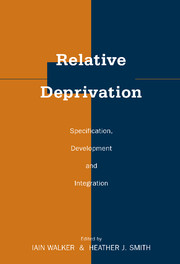Book contents
- Frontmatter
- Contents
- List of Contributors
- 1 Fifty Years of Relative Deprivation Research
- PART ONE SPECIFICATION
- 2 Fraternal Deprivation, Collective Threat, and Racial Resentment: Perspective on White Racism
- 3 Understanding the Nature of Fraternalistic Deprivation: Does Group-based Deprivation Involve Fair Outcomes or Fair Treatment?
- 4 Relative Deprivation and Intergroup Attitudes: South Africa before and after the Transition
- 5 Is It Just Me?: The Different Consequences of Personal and Group Relative Deprivation
- PART TWO DEVELOPMENT
- PART THREE INTEGRATION
- Part Four Conclusion
- Index
3 - Understanding the Nature of Fraternalistic Deprivation: Does Group-based Deprivation Involve Fair Outcomes or Fair Treatment?
Published online by Cambridge University Press: 29 September 2009
- Frontmatter
- Contents
- List of Contributors
- 1 Fifty Years of Relative Deprivation Research
- PART ONE SPECIFICATION
- 2 Fraternal Deprivation, Collective Threat, and Racial Resentment: Perspective on White Racism
- 3 Understanding the Nature of Fraternalistic Deprivation: Does Group-based Deprivation Involve Fair Outcomes or Fair Treatment?
- 4 Relative Deprivation and Intergroup Attitudes: South Africa before and after the Transition
- 5 Is It Just Me?: The Different Consequences of Personal and Group Relative Deprivation
- PART TWO DEVELOPMENT
- PART THREE INTEGRATION
- Part Four Conclusion
- Index
Summary
The development of relative deprivation theory is one of the most important advances of social science theory during the twentieth century (Tyler, Boeckmann, Smith, & Huo, 1997; Tyler & Smith, 1997). The importance of relative deprivation theory and research is that it makes clear that people's feelings and behaviors are not simply a reflection of their objective situation. Instead, people interpret their experience, judging it against internal standards. Because people exercise control over the choice of the standards against which they make comparisons, feelings of satisfaction and dissatisfaction are strongly influenced by people's decisions about the alternatives to which their objective situation ought to be compared. A particular situation might be viewed as reflecting relative deprivation if people compare their situation to that of the people around them, while if compared to their past situation, the same situation might seem satisfactory or even overabundant.
Hence, the subjective interpretation of personal experiences is central to the personal and social consequences of those experiences. This key insight of relative deprivation theory suggests the importance of the study of the interpretation of experience, which has become a core aspect of social psychology. This recognition lays the groundwork for the development of theories of social justice, theories that argue that people use principles of justice to identify the feelings of entitlement that shape people's reactions to their outcomes.
- Type
- Chapter
- Information
- Relative DeprivationSpecification, Development, and Integration, pp. 44 - 68Publisher: Cambridge University PressPrint publication year: 2001
- 7
- Cited by



